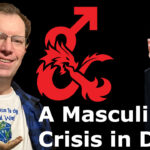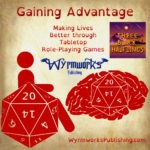Toxic Masculinity & TTRPG Culture | Gaining Advantage 037

We explore the connections between language, masculinity, and tabletop roleplaying game (TTRPG) experiences with sociologist Dr. Steven Dashiell. He studies language in male-dominated spaces like gaming conventions.
We discuss how language use, rules lawyering, gamesplaining, and off-topic conversations (metadiscourse) at gaming tables can create barriers. These reinforce masculine norms and potentially alienate players from underrepresented groups. Dr. Dashiell shares research on gendered speech patterns, the historical invisibility of women TTRPG players, and the challenges that women face asserting themselves without seeming overly aggressive.
The conversation also covers the benefits of increased gender diversity in TTRPGs. Dr. Dashiell explains how bringing your authentic self enriches the gaming experience for all. He offers insights for designers to create more welcoming, inclusive spaces.
Whether new or experienced with TTRPGs, this episode provides a valuable perspective on building a more equitable gaming culture.
Links:
- Dr. Steven Dashiell at American University: https://www.american.edu/soc/faculty/dashiell.cfm
- Dr. Dashiell’s Research and Papers: https://american.academia.edu/StevenDashiell
- Accessible Character Sheet: https://preview.drivethrurpg.com/en/product/476978/Accessible-Character-Sheets-for-DD-Players-with-Print-Disabilities?affiliate_id=2455077&src=GainingAdvantage37
- Ready-to-Roll: Fairweather Friends Kickstarter: https://www.kickstarter.com/projects/wyrmworkspublishing/ready-to-roll-last-minute-no-prep-dandd-5e-adventure-1?ref=c7371z
- Wyrmworks Publishing Patreon: https://www.patreon.com/wyrmworkspublishing?utm_source=gaining_advantage&utm_medium=podcast&utm_campaign=037
Show Outline:
00:00 Welcome and intro
00:21 Accessible character sheet for print & reading disabilities
00:56 Ready-to-Roll: Fairweather Friends D&D adventure Kickstarter
01:29 Interview with Dr. Steven Dashiell sociology of language
04:57 Gender representation in TTRPG spaces
06:24 Metadiscourse and inside references
07:21 Masculine language and behavior in gaming
08:18 Rules lawyering and excluding players
12:14 Gamesplaining
14:51 Historical gender erasure of women gamers
16:12 Benefits of diversity in tabletop RPGs
18:26 Murderhobo
25:08 Charisma in D&D and its effect on inclusion
28:36 Male dominance in D&D
31:33 Bringing your authentic self to gaming table
41:40 Designing more inclusive TTRPGs
50:32 Gendered guilt when missing game sessions
52:01 Jerks and toxic behavior study
57:31 Support Inclusive Gaming

